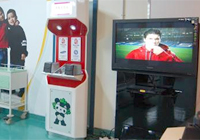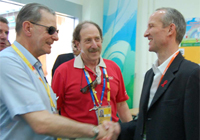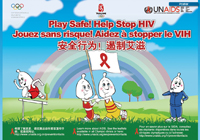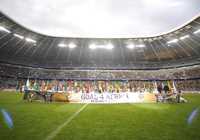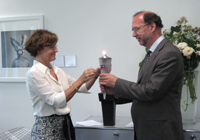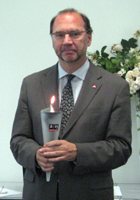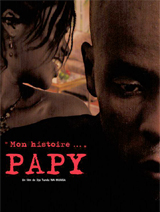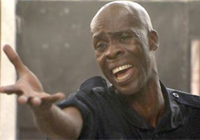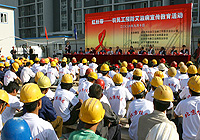 More than 200 workers gather at an
More than 200 workers gather at an
awareness activity on an Olympic c
onstruction site in Beijing. AIDS-related
pamphlets, posters, playing cards and
condoms were distributed and workers were
able to find out information about HIV and
how to protect themselves and others,
September 2006. Credit: UNAIDS A range of initiatives by UNAIDS in China in partnership with the Chinese Government and the International Olympic Committee (IOC) in the run-up to the 2008 Games illustrate how sport can break down barriers, fight discrimination and make a difference in the AIDS response.
China’s Olympic effort to raise AIDS awareness
Long before the athletes from all over the world gathered to share dreams at the Olympic Games, tens of thousands of builders have been working hard on construction sites around Beijing to prepare for the event. Many of the people working on sites such as the famous Olympic Stadium, the Bird’s Nest are migrant workers.
Migrant workers are particularly vulnerable to HIV as they are often far away from their families for prolonged periods of time.
In a bid to address the needs of migrant workers in the run up to the Olympics, the Chinese AIDS/STD Prevention and Control Foundation and the Beijing Health Bureau, in conjunction with UNAIDS, rolled out an AIDS awareness campaign at more than 20 Olympic sites over a six month period prior to the games.
Planting trees for AIDS in China
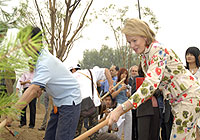 UNAIDS Special Representative Her Royal
UNAIDS Special Representative Her Royal
Highness Princess Mathilde of Belgium
joined the symbolic tree planting event led
by organizations of people living with HIV
in China, 27 June 2007 Credit: UNAIDS Many people living with HIV actively participated in Beijing’s preparation to host the Olympics Games. They have put a human face to the AIDS epidemic and helped reduce discrimination and stigma.
The Beijing Health Bureau in collaboration with local HIV advocacy groups ran a year long project where trees were planted and watered and small plates with names were tied to the trees. This initiative can trace its history back to 2006 when a group of people living with HIV decided to get more involved in public events and reduce AIDS-related stigma and discrimination.
UNAIDS and UNICEF Special Representative Her Royal Highness Princess Mathilde of Belgium joined one such tree planting event in 2007. Her Highness said: “You are showing us the way, working together to make Beijing greener for the well-being of all.”
Carrying the Olympic flame for people living with HIV in Tanzania
Beyond China, Dhamiri Mustapha, a young Tanzanian woman living with HIV was one of the 80 dignitaries who carried the Olympic flame during the five-kilometre torch relay in Dar Es Salaam, Tanzania, in April this year.
The twenty-three-year old woman showed extraordinary courage by taking part in this high-profile event in her own country. She spoke openly about the importance of condom use and urged young people to protect themselves.
In a joint message, IOC President Jacques Rogge and Dr Peter Piot Executive Director of UNAIDS, underlined how sport can break down barriers, fight discrimination and make a difference in the AIDS response. "Sport offers a perfect platform to make young people aware of the issue, to promote preventive messages, and to ensure that people living with HIV are not discriminated against. Discrimination towards a country, or a person on grounds of race, religion, politics, gender, or otherwise, is incompatible with the principles of the Olympic Movement.”
Olympics 2008: AIDS awareness training for young volunteers in China
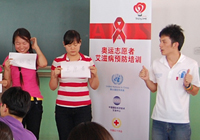 Fun and games during HIV training at
Fun and games during HIV training at
Beijing Modern Vocational and Technical
College, June 2008. Credit: UNAIDS Games have begun and as Ambassadors of the host city, young Olympic volunteers are welcoming international guests to Beijing.
As part of their preparation for the Beijing Olympic and Paralympic Games, around 7,500 volunteers at 13 universities have learned knowledge and skills on HIV prevention and how to counter discrimination through games, presentations, quizzes and interactive question and answer sessions. In parallel, 100, 000 volunteers received a basic information package on HIV before the Games.
People living with HIV participated in the training session as trainers. Their presence helped to eliminate false ideas and preconceptions about people living with HIV.
The Olympic volunteer training programme was convened by UNAIDS and United Nations Volunteers (UNV) and implemented in collaboration with the United Nations system in China, Beijing Youth League, Red Cross Society of China and Marie Stopes International (MSI) China.
The role of sport
UNAIDS and the International Olympic Committee have been working closely together since 2004 when they signed a Memorandum of Understanding in which both organizations agreed to combine their efforts to raise awareness about HIV.




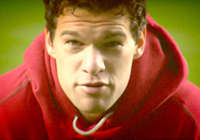

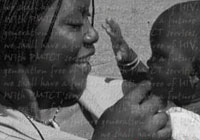
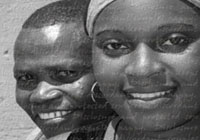

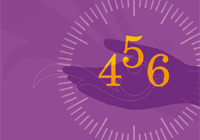

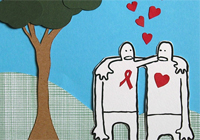 The MTV Staying Alive Foundation invites grant applications from youth-led organizations and young people who are working on HIV prevention and AIDS education campaigns within their communities
The MTV Staying Alive Foundation invites grant applications from youth-led organizations and young people who are working on HIV prevention and AIDS education campaigns within their communities